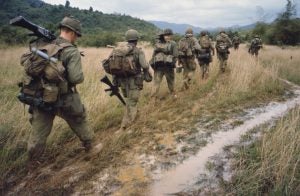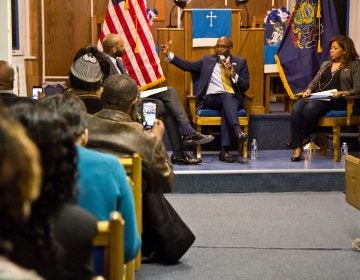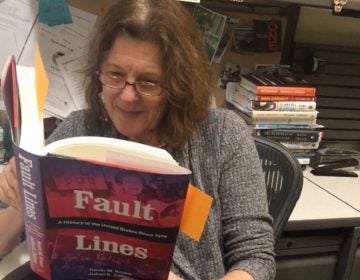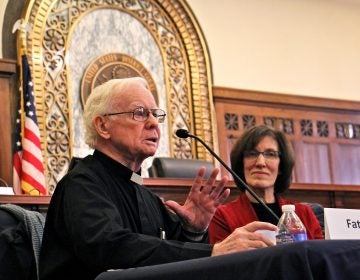My father could have died in Vietnam
Unlike so many men who were poor and black, my father didn’t go to Vietnam, and that circumstance changed what could have been — not only for my father, but also my family.
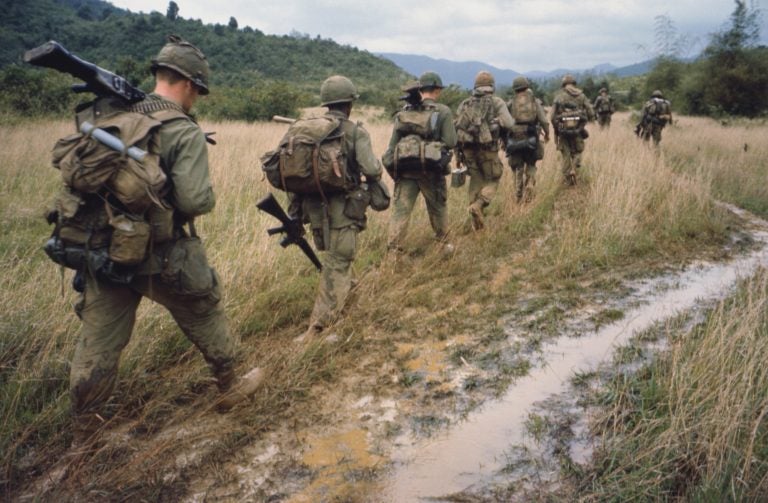
Soldiers on a search and destroy operation (Courtesy of Bettmann/Getty Images)
This story is part of a WHYY series examining how the United States, four decades later, is still processing the Vietnam War. To learn more about the topic, watch Ken Burns and Lynn Novicks’ 10-part documentary “The Vietnam War” running Sunday, Sept. 17 at 8 p.m. through Thursday, Sept. 28, on WHYY-TV.
—
In 1967, the war in Vietnam was raging. Villages like Ben Suc were burned to the ground, large American offensives like Operation Junction City killed thousands of Viet Cong and North Vietnamese soldiers, and despite a 10-to-1 advantage in casualties, America’s involvement was rapidly devolving into a quagmire.
It was against this backdrop that my father, Solomon Eugene Jones, Sr., was drafted into the Army on July 14, 1967.
Unlike so many men who were poor and black, my father didn’t go to Vietnam, and that circumstance changed what could have been — not only for my father, but also for all of us.
Born in small-town Florida, in a place called Bartow, where the segregation was marked by dirt roads and back doors, he’d come to Philadelphia for opportunity. And in a pocket of North Philly where the segregation was as sturdily constructed as the brick rowhouses and paved streets, he met my mother.
It was a turbulent time for blacks in Philadelphia. Segregation increased in the city’s schools with the proliferation of black ghettoes and the rise of white flight.
Police beat high school students who demonstrated at the Board of Education, demanding that African American history be taught in Philadelphia’s segregated schools.
The court cases surrounding Girard College — the all-white school for fatherless boys — were coming to a head after years of street demonstrations.
And as I grew in my mother’s womb, my father, fresh from receiving his draft papers, traveled to Fort Bragg North Carolina for basic training.
“I couldn’t shoot a gun,” he told me when I asked about his early experience in the army. “If you had a big old barn, I couldn’t shoot it.”
The idea of killing people was a scary thought, he said. The thought of being killed in a place like Vietnam was just as frightening. So when they shipped my father to Fort Ord, California, for infantry training, he took it seriously. The lessons were many.
“They’d send you out on simulated exercises at night,” my father said. “Take you out of the truck, give you a compass, a flashlight, and a map. Me and my crew was the first one back. I was determined I was going to learn.”
He also learned to shoot small arms like the M14 and the .45-caliber handgun. But when infantry training was over and the men received their orders, my father was sent to a since-shuttered Army base in Bamberg, Germany, and not to Vietnam.
Many of the men he trained with were not as fortunate. Most went to Vietnam, and many died.
“I felt bad for them,” my father told me. “But I also felt blessed in a way. Not that I didn’t — I don’t know, I felt sort of confused. But I was glad that I was in Germany.”
I’m glad my father was in Germany, too. Had he gone to Vietnam, he might have faced the same fate as so many black men who’d shipped out from the relative safety of North Philly.
Perhaps, like the record number of Edison High graduates killed in Vietnam, he would have died in a Vietnam rice paddy. Or maybe, like the men from Fort Ord in California, the North Vietnamese would have killed him.
If my father had gone to Vietnam, my brothers would have never been born. I would never have known my father. One half of my history would be missing. The source of my name would be a mystery.
So while others have spent decades celebrating and mourning what happened in the war of Vietnam, I have spent decades contemplating what did not.
For me, that will have to be enough.
—
To learn more, watch Ken Burns and Lynn Novicks’ 10-part documentary “The Vietnam War” running Sunday, Sept. 17 at 8 p.m. through Thursday, Sept. 28 on WHYY-TV. WHYY members will have extended on-demand access to the series via WHYY Passport through the end of 2017.
Listen to Solomon Jones weekdays from 7 to 10 am on WURD Radio.
WHYY is your source for fact-based, in-depth journalism and information. As a nonprofit organization, we rely on financial support from readers like you. Please give today.



